- Home
- Peter Orullian
Trial of Intentions Page 7
Trial of Intentions Read online
Page 7
But he couldn’t stand up. Not to return to his father’s farm. Not to find a place to hide his shame. He could only stare at the dead Far lying in front of him. That’s why he was kneeling here. That’s why he hadn’t moved. Because from his window in the deeps of night, he’d seen this Far’s spirit. Like he’d seen so many spirits over the last moon cycle.
The first time had come a day or two after his and Tahn’s encounter with the barrow robber in the wilds of Stonemount. That ghostly creature had put its filthy hand in Sutter’s chest. Changed him somehow. Given him this damned sight. He’d realized it when he’d seen the soul of a Sheason woman scheduled to burn the next day. Her spirit had found the guest room window where he’d been laid up, healing.
Last night had been much the same. Except he’d seen thousands …
Then this morning, he’d gotten separated from Vendanj and the others. He’d been in trouble. This Far in front of him had come to his defense, and gotten killed for it.
I saw the spirit of a man who would later die saving my life.
And this Far was not the only one. Sutter had insisted on going into the fray. Several had died rallying to save him as he made a poor job of his own defense. He eyed his Sedagin blade again with disgust.
Did I kill them? Because I’m no damn good with a blade, did I kill them?
The bodies of the Far whose spirits he’d seen from his window in the small hours of night now lay dead across the rocky plain. They’d sought him out. He had no damn clue what they’d wanted, and it gnawed at him.
He reached out and gently closed the Far’s eyes. He had no elegy to offer. But he knew a simple farmer’s poem, and whispered it, the sound lost beneath the scrape of boots over shale: “The earth is warm and will provide. She’ll give you meat and later become the best, last bed to your weary hands.” It was something his father said every morning when he led them to another day’s labor in the field. That’s what Sutter was, even still: a rootdigger. Yes, he might be better with a blade now than when he’d left his father’s farm, but ask him to root out some potatoes and you’d see his true talent.
Da’s farm. He missed that place an awful lot. Missed hearing his father’s daily poem.
Wanting to find his friends, he finally pushed himself up. A sickening dread opened in the pit of his stomach. He’d never scoured a battlefield before. He clenched his blade until his fingers ached, unable to loosen his grip, which was sticky with blood. There was blood all over his clothes, too. The remnants of death had soaked his shirt and trousers just as they’d soaked the soil around him. He felt like a blood rag, the kind used to prepare the dead for burial.
He moved from body to body, recognizing more Far whose spirits he’d seen the night before. More who’d died defending him. He turned fast, dropped to his knees in an open area, and retched. His gut continued to heave long after it was empty.
Staring down at the sour spillage, he vowed to become decent with his sword. It might not be enough to ease his guilt. But it was part of the answer. A part he could do something about, by damn.
He struggled to stand again, then continued his search through the bodies of the fallen. He placed his feet carefully on shale that was slick with blood. Many of the surviving Far had begun to wend their way back toward the city. The few who remained stood talking in reverent tones, looking north and west.
A moan.
At first it sounded like just another Far conferring over the dead. But it became distinct the farther east he moved. That’s someone in pain. Sutter hurried, following the sound to a heap of dead Far. But none in the heap seemed alive. Then he realized what he was seeing. He grabbed one of the Far by the arm, and gently pulled him off the pile. Then another. Three bodies later, Sutter stared down at one of the living.
“Wendra!” He smiled wide, glad to see her. “You’re a wreck.”
She clearly hadn’t eaten in days. The dusky brown hair he’d only touched once lay matted and tangled. Her eyes were badly bloodshot, and darkly ringed from lack of sleep. And blood covered her cheeks and chin. He dropped to his knees and wiped it away with his hands.
“Where are you hurt?”
She moaned again, sucking air like one who’s been too long underwater, and shook her head.
“Show me,” he insisted.
Wendra drew more ragged lungfuls of air, as though learning to breathe. “I’m not hurt,” she rasped.
He pulled a bit of balsa root from his pouch and broke off a small piece, pushing it gently into her mouth. “Eat this anyway.”
She gulped it down whole and turned to look at the dead Far that Sutter had pulled off her. “They piled on top of me.” She took another deep, stuttering breath. Her next words were hard to hear. “Why would they…?”
A look of understanding spread on her face. Her mouth opened wide in a silent cry. In that moment, Sutter knew the battlefield rumor was true: Wendra’s song had torn at Quiet and Far alike.
She gasped, filling her lungs as if she might sob or wail. She did neither, but stared at him with pleading eyes. He pulled her close, and began to rock forward and back, the way his mother had when he was sick.
He wanted to say something that would help. But he had no words for any of this. Best he could do was hold her while she suffered it out.
They sat that way for an hour. A mild breeze tugged at their hair as he held her and they stared away south.
Wendra spoke first, her voice soft when she asked, “How are you?”
Not wanting to share the curse of seeing the dead before they fell, Sutter just shook his head. “I’m a fool.” He swallowed hard. “A lot of them died saving me. I don’t know how I’m going to live with that.…”
Wendra nodded and sat up. “These Far…” She motioned to the dead bodies Sutter had dragged off her.
“I know.” He took a long look around. “And I understand they honor an oath and all that. But does it make you feel like they think we’re something we’re not? Like they’ve placed some faith in us that we just don’t deserve? I’m a godsdamned rootdigger.”
Wendra looked back at him with understanding eyes. And he decided to tell her. Like he’d told Tahn.
“I wouldn’t be here at all if it weren’t for my da,” he began.
Her brow furrowed with question.
A wan smile touched his face. “I’m not truly a Te Polis. My father was walking his fields when he saw a couple of pageant wagon folk out in his hay. They were birthing their baby. And when that child came out, they started to put it down in a water bucket. Drown the boy.” He looked into her eyes. “That was me.”
“Dear gods, Sutter…” Wendra put a hand in his.
“Don’t know who they are. But I have a good righteous hate for them.” He clenched his teeth a moment. “Part of leaving the Hollows was wanting to find them. No idea what I’d say. But I’d probably start with something about that bucket.” He laughed to keep from crying, his emotions raw from the sight of so much death. “I’d beat the last hell out of them. That’s what I’d do. A day doesn’t go by that I don’t think about that bucket.” His smile came more warmly. “Or about my real da—the one who saved me from that bucket.”
“You’re like him, Sutter.” She shook his hand gently. “You showed me kindness when no one else would.”
He returned her thoughtful look, remembering hard days in the Hollows. Then he pointed at the Far, thinking of those who’d died defending him. “I’ve been saved too many times by others. I should try and return the favor for someone else.” New firmness settled his nerves. “At the least, no one else will die because of me.”
Wendra nodded understanding and got to her feet. “Where are Tahn and the others?”
Sutter stood, too. “I haven’t seen them.”
“They’re probably fine,” she said. “We won’t find them in the dark anyway. Help me back to the city.”
He hoped she was right.
He pulled one of her arms around his neck and put his other arm a
round her waist. Together, they started back. It was only then that he relaxed, realizing for the first time that he hadn’t seen any of his friends’ spirits. They weren’t dead. Not yet.
CHAPTER NINE
Lamentations: The Past
I don’t think we have any idea what might result from orbital dissonance. And by the time we do, it may be too late.
—From the end papers of Scant Evidence of Eternal Truths, a cosmologer’s philosophy text
In the late-afternoon sun, Tahn gently removed his arrows from the bodies of the six children he’d shot down. He looked a long moment at the peaceful face of each child before covering them with heavy wool blankets he’d brought from the city. He then laid them side by side. And wept. He wept for young lives ended so early. And he wept for himself.
“I wish I could have found another way,” he whispered. “Please rest well.”
He wiped his eyes, tied back his hair, and began to dig their graves. He hadn’t been at it long when someone interrupted him.
“Can I help?” The weathered voice of Grant. His father.
“We’ve had plenty of practice, haven’t we?” Tahn continued to dig without looking up.
Devin. A friend from Tahn’s time in the Scar. The memory of her had flared that morning when he’d shot to spare these little ones. She’d been one of many that his father had cared for in that hellish place.
“I guess we have.” Grant had brought his own pick and shovel, like hundreds of Far who were burying their countrymen across the Soliel plain.
Without further discussion, the two worked the hard soil together. Only the sound of iron striking dirt and shale accompanied them for most of an hour. Their shadows, often moving in unison, reminded Tahn how much he looked like the man. Grant’s hair was close-cropped and a paler shade of black due to his years beneath a Scar sun. His skin darker. But a considering, sometimes broody brow over sky-colored eyes might have been Tahn’s own.
They managed to carve out several short pits—the graves for these little ones needn’t be long.
After the digging, they stood back, resting their arms. The stillness of dusk had settled in around them. Grant broke the silence. “We haven’t really spoken since Vendanj restored your memory. How are you?” There was a moment’s hesitation before he added, “You probably have questions. Maybe I can help.”
Tahn looked out over the shale where the Velle had almost rendered the lives of these children. “The Scarred Lands were formed by Velle. Did they do it this way?” He pointed at the six wrapped bodies.
Grant leaned in on his shovel. “No, they drew energy from the earth during the Battle of the Round. That’s what left everything barren.”
Tahn could see it in his mind. A wide place of dryness, of black dust, of red stone, of bleached wood, of hard sun.
“You had to live there because you tried to stop the regent’s child from being revived by a Sheason.” Tahn looked at his father, wondering how anyone could do such a thing.
Grant sighed with understanding. “Reviving a child violates the most basic principles of the Charter, Tahn: Men are not gods; the dead should be allowed to rest.…”
Tahn looked down at the little ones laid across the hard shale. If he had the power to revive them, he’d do it in an instant. Let the Charter burn. Then he looked up at Grant, whose eyes were locked on the same blanket-wrapped bodies. There was a weariness in his father’s face that Tahn couldn’t remember seeing before, as if the man had been caring for children in a dry, rough place for a long time … and failing.
“I was seven when you sent me to Aubade Grove.” Tahn turned his gaze to the southwest, where nations away the Grove stood. “I was happy there. Studied the stars. Other sciences, too. For a while.”
Tahn had been torn away from the Grove after four short years, and sent back into the company of his father. Into the Scar. Half a year later, Alemdra and Tahn had been out on patrol. They’d shared a first kiss. And they’d witnessed Devin’s jump.…
He found he did have a question for his father. “How many have taken their own lives?”
There was no surprise in Grant’s face. He knew what Tahn meant.
“Thirty-seven.”
And from the way he said it—with such sad certainty—Tahn guessed Grant knew every name, too. They kept a mutual silence for those dead wards of the Scar.
After a time, Grant interrupted their quiet moment. “Tahn, you’ll learn this sooner or later. And I should be the one to tell you. One of the thirty-seven … was Alemdra…”
Tahn grew weak in the legs. He dropped to one knee, his eyes suddenly hot with tears. He shook his head. No, Alemdra.
Grant put a hand on Tahn’s back. “I don’t think she was the same after Devin. Blamed herself. It was a few years.…”
Tahn understood. Since remembering Devin, he’d felt the same guilt. Damn me. All because he’d wanted his morning sunrise. And a kiss.
Grant removed his hand from Tahn’s back and took a deep breath of the cooling air. “People will disappoint you. It’s not usually malicious on their part. And it’s not usually done with good intentions, either … as I tried to do with you. But motivations won’t matter when someone fails you.”
He looked over at his father. “You mean the way thirty-seven wards failed you by giving in to the Scar.”
Grant shook his head, his voice raw with grief when he said, “I mean the way I failed my wards. Especially those thirty-seven … Especially you.”
It was the first time Tahn had seen the man hurting. Grant swallowed hard. “That’s the wisdom of an exile. Others will have brighter things to tell you. But they won’t make what I’ve said untrue. And at some point, Tahn, you’ll have to decide that you do all this,” he gestured around them, “because you want to. Not because the Sheason asks it.”
Tahn turned his sight skyward. The moon and stars shone brittle and bright, casting silvery light on the edges of stones and dolmens and patchy grasses. As it always had, it comforted him to simply gaze up and lose himself in the vastness of the heavens.
But the comfort was brief. At his feet were six dead children. As dead as Devin. As dead as Alemdra, who’d kissed him and spoken of leaving the Scarred Lands. As dead as the thirty-seven.
He hated the Scar. He hated the Quiet for creating the Scar—a desolate land that grew each year, as if the effects of the Quiet weren’t done. More barren terrain. More wards. Every cycle of the moon.
And every few cycles, a ward chose to leave, using death as an escape.
“That’s one of the reasons we took your memory,” Grant said, sounding confident of the decision, but still tired. “It started to get to you. It gets to all of us in one way or another, I guess. But in you, it was taking a toll.” Grant looked him straight, hesitating a moment. “I’m not sure you’d have made it, otherwise.” The thought chilled Tahn. He might have joined Devin, Alemdra. “We thought it would be easier for you to deal with when you got older. So, we veiled your memory and sent you to the Hollows. Safer there, too.” His father sounded less sure of the last part. “Fewer friends to watch die, anyway.”
He remembered many of their faces and names. Terrible thing to lose a friend as a child. Hard to make sense of it. No one to blame. Nothing to be done about it. And saying good-bye to a friend—good-bye, Alemdra—who had already gone to her earth … was a hollow good-bye.
That’s what the Scar meant to him. That’s what the Quiet meant. In that moment, he decided which side of things he was on.
“I didn’t use the old words today.” Tahn paused a long, painful moment. “It was my choice. I imagined their lives. Imagined how they’d die. I couldn’t save them. But I couldn’t watch them suffer either. And if there’s a next life, I sure as every hell wasn’t going to let the Velle steal their chance to be family there.” He stopped, breathed. “So, I killed them.”
Grant squeezed Tahn’s shoulder in a comforting way. Then offered another sad smile when he said, “Much as you’ll hate
to hear it, you sound like me.” He then spared a long look at the graves they were digging. “You showed them mercy. A tough mercy. But mercy just the same. You may need to live with your guilt for a while, which isn’t a bad thing. Guilt tempers a man the way forge coals do a good steel. But not for long, Tahn. For a while, then let it go.”
“The way you’ve let go of your guilt.” Tahn smiled weakly.
“Ah, but I’m a bastard, Tahn. Or didn’t you know.”
They both laughed. The sound of it was the best eulogy they might have offered over the six small ones.
Tahn gazed upward again.
Grant looked in the direction he saw Tahn staring. “What is it?”
“We had a lunar eclipse last night,” Tahn said. “Did you see it? Red moon.”
“I’m no good with moons and such. I’m better with people.”
They laughed again. Easier this time.
“Stars are as clear here as they are in the Scar,” Tahn observed. “But not nearly as bright as they are in the Grove.”
The Grove. Those had been good years. Kind years. Spent in a place where his natural affinity for the heavens could be fostered, pushed.
“I never visited you there. But I’m told you made a name for yourself.”
Tahn then pointed into the northwest at a planet he knew all too well. “Pliny Soray. See her?”
Grant scanned the sky and fixed on Soray. “I do. I wouldn’t have if you hadn’t pointed her out.”
“She’s off her course,” Tahn replied with the distraction of memories that were fitting together like puzzle pieces in his head. Memories of the Grove. Of Pliny Soray. And one memory in particular.
* * *
“A good astronomer can learn as much observing a vacant stretch of sky as he ever will measuring out the procession of a great starry field.” Scalinou Dechaup huffed the words out as he led Tahn up the tower steps. All 998 of them. The same as the other four towers.
“So, we’re going to look at empty sky tonight?” Tahn asked, a wry grin on his face.
Scalinou, savant of the College of Cosmology, paused in his ascent, and gave Tahn a sidelong look. “You up to the challenge?”

 At the Manger
At the Manger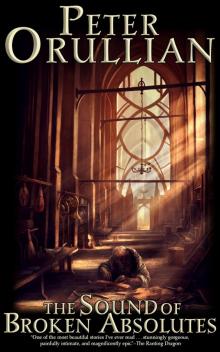 The Sound of Broken Absolutes
The Sound of Broken Absolutes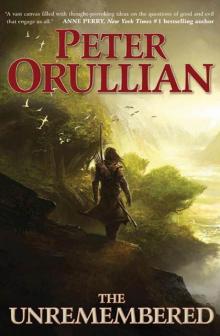 The Unremembered: Book One of The Vault of Heaven
The Unremembered: Book One of The Vault of Heaven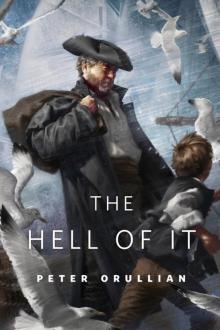 The Hell of It
The Hell of It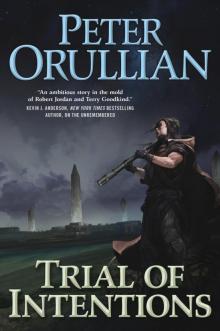 Trial of Intentions
Trial of Intentions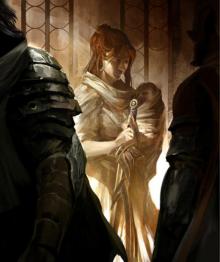 The Great Defense of Layosah
The Great Defense of Layosah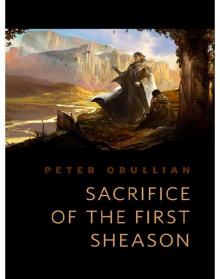 Sacrifice of the First Sheason
Sacrifice of the First Sheason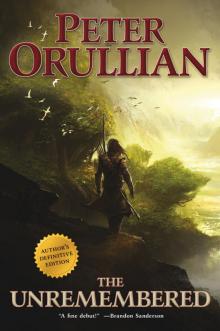 The Unremembered
The Unremembered